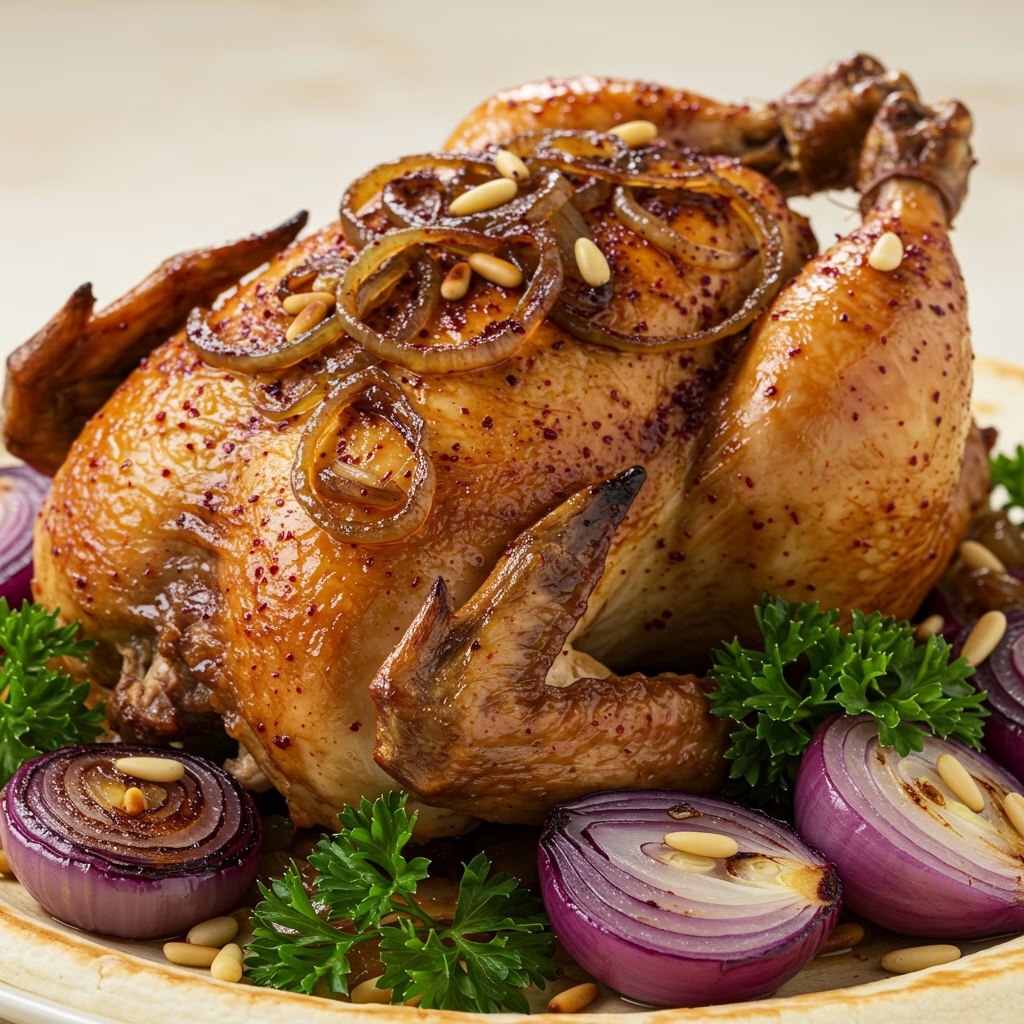Musakhan (Palestinian Roasted Chicken) is a celebrated dish that captures the heart and soul of Palestinian cuisine.
Known for its deep, earthy flavors and rich cultural significance, Musakhan features sumac-spiced chicken roasted with caramelized onions and laid over flatbread soaked in olive oil. Traditionally eaten with the hands, it is a symbol of warmth, hospitality, and community.
In this article, we’ll guide you through a fully authentic Musakhan recipe, explore its history, offer tips, healthier alternatives, creative twists, and help you avoid common pitfalls. Let’s dive into the art of crafting this delicious Palestinian masterpiece.
Table of Contents
Ingredients for Musakhan (Palestinian Roasted Chicken)
Serves: 4 to 6 people
For the Chicken Marinade:
- 1 whole chicken (about 1.5 kg), cut into 4 or 6 pieces
- 4 tablespoons sumac
- 1 tablespoon ground allspice
- 1 teaspoon ground cinnamon
- 1 teaspoon black pepper
- 1 teaspoon paprika
- 1 tablespoon salt
- Juice of 1 lemon
- 5 tablespoons extra virgin olive oil
For the Onion Topping:
- 5 large red onions, thinly sliced
- 4 tablespoons sumac
- ½ teaspoon ground cinnamon
- 1 teaspoon salt (adjust to taste)
- ½ cup high-quality olive oil
For Assembling:
- 4 large taboon or markook flatbreads (or use naan or pita as alternatives)
- Toasted pine nuts or slivered almonds (for garnish)
- Fresh parsley (optional, for garnish)
- Lemon wedges (for serving)
Step-by-Step Instructions
Step 1: Marinate the Chicken
- Clean and pat dry the chicken pieces.
- In a large bowl, mix lemon juice, olive oil, sumac, allspice, cinnamon, paprika, salt, and pepper to form a marinade.
- Rub the marinade thoroughly into the chicken pieces, ensuring every part is coated.
- Cover and refrigerate for at least 2 hours, ideally overnight for maximum flavor.
Step 2: Prepare the Onion Topping
- In a large skillet, heat olive oil over medium-low heat.
- Add the sliced onions and sauté gently until soft and golden brown (around 20–25 minutes).
- Stir in sumac, cinnamon, and salt. Continue to cook for another 5 minutes until the onions are deeply caramelized and aromatic.
- Remove from heat and set aside.
Step 3: Roast the Chicken
- Preheat your oven to 200°C (390°F).
- Place the marinated chicken on a baking tray lined with parchment paper.
- Roast for 40–45 minutes or until the chicken is cooked through and skin is crispy and browned. Internal temperature should reach 75°C (165°F).
- Optional: Baste the chicken with pan juices halfway through for extra flavor.
Step 4: Assemble the Musakhan
- Warm the flatbreads slightly to make them pliable.
- Arrange them on a serving tray or large platter.
- Drizzle some of the onion-infused oil onto the breads.
- Spread a generous layer of the caramelized onions over the flatbread.
- Place the roasted chicken pieces on top.
- Garnish with toasted pine nuts and parsley.
Step 5: Serve and Enjoy
- Serve warm with lemon wedges on the side.
- Traditionally eaten by hand, Musakhan brings people together—encourage your guests to dig in communal-style!
Serving Suggestions
- Accompaniments: Musakhan is often enjoyed with a side of plain yogurt, cucumber salad, or Arabic pickles.
- Drinks: A mint tea or laban (salted yogurt drink) complements the richness of the dish beautifully.
- Presentation: Serve on a large round platter for an authentic, communal dining experience.
- Occasions: Ideal for family gatherings, festive celebrations, or any time you want to share a meal made with love.
Tips for Perfect Musakhan (Palestinian Roasted Chicken)
- Sumac Quality Matters: Use high-quality, deep purple sumac for authentic tanginess.
- Don’t Rush the Onions: Take your time to caramelize the onions slowly, it’s essential to the dish’s signature flavor.
- Use Traditional Bread if Possible: Taboon or markook flatbreads absorb the onion oil best and hold the structure well.
- Let It Rest: Allow the dish to sit for a few minutes after assembly. The bread soaks up the juices, making it more flavorful.
- Chicken with Skin-On: This adds extra richness and keeps the meat moist while roasting.
Healthier Alternatives
- Use Skinless Chicken: Reduce fat content by using skinless chicken breasts or thighs.
- Air Fryer Chicken: Air fry the marinated chicken at 200°C (390°F) for 20–25 minutes to cut down on oil.
- Reduce Olive Oil: Use half the amount of oil and supplement with a splash of low-sodium chicken broth during the onion sautéing process.
- Whole Grain Bread: Swap traditional white flatbread for whole wheat pita or whole grain lavash.
- Add Veggies: Serve with a side of roasted vegetables or a fresh salad to balance the richness.
Creative Variations
- Musakhan Wraps: Use smaller pieces of boneless chicken and roll them in flatbread with onions for a portable version.
- Musakhan Pizza: Use naan or pita as a base, spread with onions, shredded roasted chicken, and bake briefly.
- Vegetarian Version: Substitute chicken with mushrooms or roasted eggplant for a flavorful vegetarian take.
- Lamb Musakhan: Use lamb shoulder or leg instead of chicken for a richer, deeper flavor profile.
- Spicy Musakhan: Add chili flakes or chopped green chilies to the marinade or onion mix for a kick.
Common Mistakes to Avoid
- Skipping the Marination Time: Short marination equals bland chicken. Let it soak in those spices!
- Overcooking the Chicken: Dry chicken ruins the experience—use a meat thermometer if unsure.
- Rushing the Onions: Caramelizing onions takes time; high heat will burn them, not brown them.
- Too Much Oil: While olive oil is traditional, don’t overdo it—especially if not using traditional bread which absorbs better.
- Serving It Cold: Musakhan should be served hot and fresh, allowing all the flavors to shine.
History of Musakhan (Palestinian Roasted Chicken)
Musakhan is deeply woven into the culinary and cultural fabric of Palestine. Derived from the Arabic word meaning “heated” or “something that is heated,” Musakhan reflects the age-old tradition of simple yet rich home cooking. Its main ingredients sumac, olive oil, onions, and flatbread are staples of the Palestinian countryside, and the dish showcases the resourceful use of local produce.
Historically, Musakhan was prepared during the olive harvesting season. After long days in the groves, families would gather and prepare Musakhan using the freshly pressed olive oil of the season. The liberal use of sumac, with its tangy citrus flavor, balances the rich oil and makes the dish unique. It is not just food; it is a celebration of harvest, home, and heritage.
Over the years, Musakhan has become more than just a seasonal meal, it is now a national symbol of identity and pride. It is commonly served at weddings, family gatherings, and cultural events across Palestine and among Palestinian communities around the world. In fact, in 2010, a group of Palestinian chefs prepared the world’s largest Musakhan, setting a Guinness World Record to showcase their culinary legacy to the world.
FAQs about Musakhan (Palestinian Roasted Chicken)
1. What is sumac, and where can I find it?
Sumac is a tangy, lemony spice made from dried berries. It’s commonly found in Middle Eastern grocery stores or online.
2. Can I use boneless chicken for Musakhan?
Yes, boneless thighs or breasts can be used, especially for wraps or quicker versions. However, bone-in adds more flavor.
3. Is Musakhan gluten-free?
Traditionally, no. But you can make it gluten-free by using certified gluten-free flatbreads.
4. How long can leftovers be stored?
Leftovers can be stored in an airtight container in the fridge for up to 3 days. Reheat in the oven for best results.
5. Can I freeze Musakhan?
You can freeze the roasted chicken and caramelized onions separately for up to 1 month. Assemble fresh before serving.
6. What makes Musakhan different from other chicken dishes?
Its heavy use of sumac, caramelized onions, and the bread base drenched in olive oil distinguishes it from other regional dishes.
7. Can I make Musakhan vegetarian or vegan?
Yes, use mushrooms, tofu, or eggplant instead of chicken, and ensure the bread is plant-based.
8. What type of bread works best?
Traditional taboon bread is ideal, but you can substitute with naan, pita, or even lavash.
9. Is it spicy?
Musakhan is not spicy but tangy and earthy. You can make it spicy by adding chili flakes.
10. Is Musakhan eaten with utensils?
Traditionally, Musakhan is eaten with hands, making it a more communal and tactile dining experience.
Musakhan (Palestinian Roasted Chicken) is more than just a dish, it’s a heartfelt tradition that tells a story with every bite.
From its simple ingredients to its profound cultural roots, Musakhan offers an authentic taste of Palestine’s culinary heritage. Whether you’re preparing it for a special gathering or trying it out as a weeknight dinner, its richness, aroma, and warmth are bound to leave a lasting impression.
Try your hand at this beautiful, soul-satisfying dish, and share a piece of Palestine with those you love.


